Tagged: “forgiveness”
FORGIVENESS IS A GIFT
Over the past 20 years, Joe Daguanno has climbed the corporate ladder at the Mid-West Family of Companies to become Chief Profit Strategist – Partner. That means he is a media, branding, and advertising professional who excels at revenue generation. He’s also a pretty good, and consistent, blogger.
What’s up in the Cosmos? is the title of Daguanno’s personal blog that he has been writing for the past dozen years. His recent Dec. 20 blog post was titled “The Gift of Forgiveness.” Here’s a brief excerpt:

Joe Daguanno, Chief Profit Strategist – Partner, Mid-West Family of Companies
Forgiveness is a gift. It’s love. It’s generosity. It’s mercy.
As we give this gift, we heal.
Holding a grudge acts like a tourniquet to the flow of healing. It closes the heart and the wounds remain open.
Real forgiveness takes strength. It takes courage. It takes honesty. It takes time.
But it’s worth it.
So very much.
Daguanno’s depth of perception about forgiveness developed several years ago when he met Dr. Robert Enright, forgiveness research pioneer and founder of the International Forgiveness Institute (IFI). That encounter led Daguanno to spearhead development of a series of public service announcements that were broadcast hundreds of time on Wisconsin Public Radio and by numerous commercial radio stations throughout the Midwest—all at no cost to the IFI.
As his title references, Daguanno is a partner in Mid-West Family of Companies—an alliance of more than 40 radio stations covering 8 separate geographic markets–all assembled by the late Dr. William Walker and his son Thomas Walker. Dr. Walker co-founded the IFI along with Dr. Enright in 1995. Thomas Walker continues to provide the IFI with both financial and hands-on support through the Walker Family Trust.
Read Daguanno’s full Dec. 20 blog: “The Gift of Forgiveness.”
Partnership Achievement Award Presented to Mary Lou Coons
Mary Lou Coons, founder of the Puppets For Peace Foundation, has been recognized with the “Healing Hearts Hero Award” by the International Forgiveness Institute (IFI). The award recognizes exceptional efforts by individuals who have partnered with the IFI and its co-founder, Dr. Robert Enright, to advance the broader understanding and application of the virtue of forgiveness.

Mary Lou Coons
An always-cheerful optimist, Mary Lou excels at using every tool available to her to overcome life’s adversities–like the brain and spinal cord maladies that have caused her to endure years of debilitating pain as well as repeated life-threatening (and life-saving) surgeries.
In fact, just days after her second Chiari Malformation brain surgery (technically known as posterior fossa decompression surgery) in 2012, Mary Lou made her first call to the IFI after learning that Dr. Enright was pioneering Forgiveness Education work with children. She was convinced that her passion for ventriloquism and puppets could somehow supplement those efforts so she volunteered her services.
In the ten years since then, Mary Lou has become a self-appointed “forgiveness ambassador” on a mission to teach as many others as she can about the benefits of forgiveness. Her efforts have included:
- Single-handedly convincing her parish elementary school (Holy Family School, Syracuse, NY) to adopt and teach Forgiveness Education in all of its classrooms from pre-kindergarten through 6th grade;
- Organizing and setting up a display booth to promote forgiveness to the more than 1,000 attendees at a Women’s Conference in Syracuse – resulting in more of the state’s schools considering the use of Forgiveness Education Curriculum Guides;
- Creating and producing three video recordings featuring her red-haired puppet Lily that are used by elementary school teachers to help illustrate Forgiveness Education principles to students;
- Introducing IFI staff to teacher-missionaries in Rwanda in order to add that country to the list of more than 30 around the world where Forgiveness Education is being taught;
- Producing a 10-minute online video version of Rising Above the Storm Clouds, Dr. Enright’s storybook for children, that is used in the 3rd and 4th grade programs.
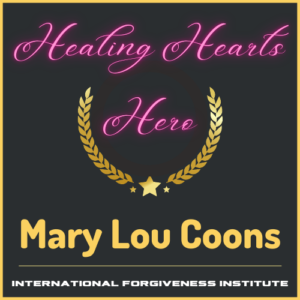 “Despite all that activity, Mary Lou never asked for a penny of payment or reimbursement,” Dr. Enright said in recognizing her with the Healing Hearts Hero Award. “Through the Puppets for Peace Foundation she set up 15 years ago, she continues to make important contributions that focus particularly on the lives of one of our most important assets—our children.”
“Despite all that activity, Mary Lou never asked for a penny of payment or reimbursement,” Dr. Enright said in recognizing her with the Healing Hearts Hero Award. “Through the Puppets for Peace Foundation she set up 15 years ago, she continues to make important contributions that focus particularly on the lives of one of our most important assets—our children.”
According to Mary Lou, the mission of her foundation is “to help spread peace, love and forgiveness. One of the best ways I’ve found to do that is by working with Forgiveness Education programs because it brings happiness to my heart as well as to the hearts of so many others.”
Visit the Puppets for Peace Foundation website.
Consider Giving the Gift of Forgiveness This Year
In the season of giving, one of the most beautiful gifts you might consider giving is forgiveness. The ideas that forgiving is a gift to those who have hurt you sometimes gets forgiveness into trouble. In other words, people think it is irrational to consider offering a gift to those who are unfair. The typical reasons for this resistance to forgiveness as gift-giving are these:
- It is dangerous to reach out to those who act unfairly because I am open to further abuse.
- My gift-giving might be a signal to the misbehaving others that their actions are acceptable, which they are not.
- Gift-giving to those who acted unfairly seems counter-intuitive to my own healing. I need to move on and not focus on this other person.
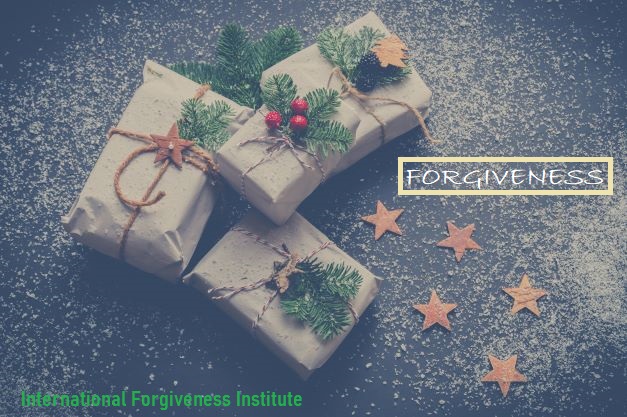 The ideas above can be countered this way: With regard to (A), you do not necessarily have to reconcile with an unrepentant person who keeps harming you. You can give your gift from a distance, such as a kind word about the person to others or an email so that you can keep your distance if this is prudent to do so. With regard to (B), you can forgive and ask for justice. Forgiving never means that the other just goes ahead as usual with hurtful behaviors. In other words, if you decide to forgive, you can and should ask for fairness from the other person. With regard to (C), forgiveness will seem counter-intuitive as goodness to those who are not good to you only if your focus is entirely on justice or a fair solution to the problem. If you begin to see that mercy (in the form of forgiving) and justice can and should exist side-by-side, then perhaps this idea of forgiveness as a contradiction or as inappropriate or as somehow odd may lessen in you.
The ideas above can be countered this way: With regard to (A), you do not necessarily have to reconcile with an unrepentant person who keeps harming you. You can give your gift from a distance, such as a kind word about the person to others or an email so that you can keep your distance if this is prudent to do so. With regard to (B), you can forgive and ask for justice. Forgiving never means that the other just goes ahead as usual with hurtful behaviors. In other words, if you decide to forgive, you can and should ask for fairness from the other person. With regard to (C), forgiveness will seem counter-intuitive as goodness to those who are not good to you only if your focus is entirely on justice or a fair solution to the problem. If you begin to see that mercy (in the form of forgiving) and justice can and should exist side-by-side, then perhaps this idea of forgiveness as a contradiction or as inappropriate or as somehow odd may lessen in you.
Forgiveness can be a gift in these ways:
- As you forgive, you are giving the other person a second chance at a trustworthy relationship with you. Of course, trust takes time to develop, but forgiveness opens the door, even if a little, to trying the trust-route with the other who behaved unjustly.
- Forgiveness can be a merciful way of showing the other what the injustice actually is (or was), making possible positive change in the other. Those who behave badly and are offered this mercy may begin to see the unfairness more clearly and have the inner conviction that change indeed is necessary.
- Forgiveness can be a gift to yourself as you shed abiding anger that could have been yours for many years. You have a second-chance at stronger mental health.
- As you reduce toxic anger, this actually can be an aid in strengthening your relationships with people who were not the ones who acted badly. After all, when people carry around a lot of anger in their hearts, they can displace that anger onto unsuspecting others. Your forgiving one person, then, can be a gift to others who do not have to endure your displaced anger.
So, then, what do you think? Do you see that in the season of giving, one of the most beautiful gifts you might consider giving is forgiveness?
![]()
A Fireside Chat with Dr. Robert Enright
Dr. Robert Enright, the 2022 recipient of the prestigious American Psychological Foundation (APF) Gold Medal Award for Impact in Psychology, is featured in a just-released video presentation titled “APF at Home: A Fireside Chat with Dr. Robert Enright.”
The 1 hr. 25 min. fireside chat is part of a series developed by the APF that focuses on pioneering American psychologists “whose work has had a game-changing impact on the field of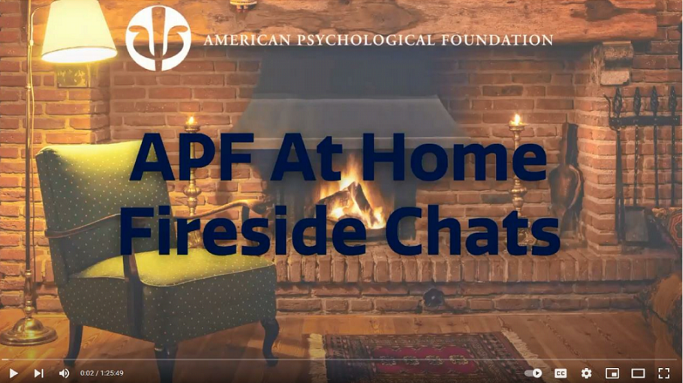 psychology.” Dr. Enright, founder of the International Forgiveness Institute (IFI), has been called “the forgiveness trailblazer” by Time magazine. His 37-years of forgiveness research has resulted in noteworthy innovations in forgiveness education and forgiveness therapy.
psychology.” Dr. Enright, founder of the International Forgiveness Institute (IFI), has been called “the forgiveness trailblazer” by Time magazine. His 37-years of forgiveness research has resulted in noteworthy innovations in forgiveness education and forgiveness therapy.
“Fireside Chats,” became a popular communications tool when President Franklin Roosevelt began a series of radio broadcasts that aired from 1933 through 1944. They were planned as conversations rather than stiff public speeches and were widely listened to because all the national radio networks carried them. In them, the President appeared to talk with his listeners rather than lecturing at them. And, yes, he actually sat next to the White House fireplace during the broadcasts.
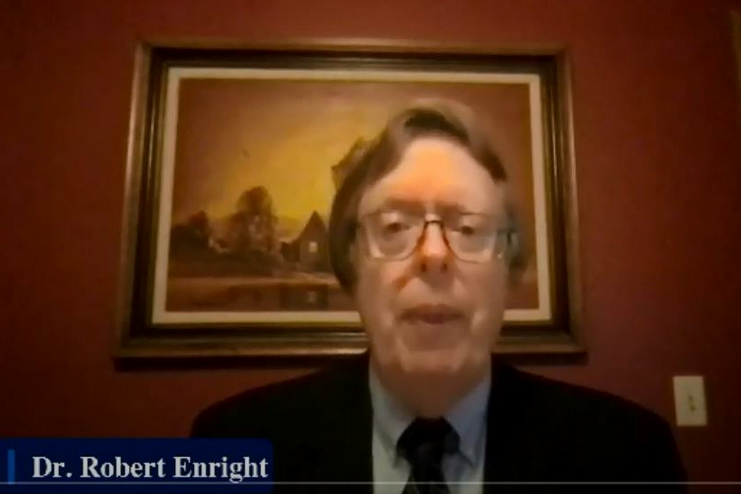 The fireside chats now being produced by the APF are intended to replicate that informal ambience. The latest interview, for example, features APF Trustee Dr. Katherine Nordal chatting with Dr. Enright. She asks him questions like how he selected forgiveness as the topic of his life’s work, how his Process Model of Forgiveness can be used in therapy interventions, and how forgiveness can become the crucial missing piece of the world’s peace puzzle. Dr. Enright answers questions submitted by viewers of the live presentation during the final 20 minutes of the session.
The fireside chats now being produced by the APF are intended to replicate that informal ambience. The latest interview, for example, features APF Trustee Dr. Katherine Nordal chatting with Dr. Enright. She asks him questions like how he selected forgiveness as the topic of his life’s work, how his Process Model of Forgiveness can be used in therapy interventions, and how forgiveness can become the crucial missing piece of the world’s peace puzzle. Dr. Enright answers questions submitted by viewers of the live presentation during the final 20 minutes of the session.
Dr. Nordal is well-equipped to conduct the APF fireside chat with Dr. Enright. She is a licensed psychologist whose distinguished career included owning and managing a full-time group private practice in Mississippi for 28 years. She spent another 10 years as Executive Director for Professional Practice for the American Psychological Association (APA) before retiring in 2018.
APF is the private grant-making arm of the APA and provides more than a million dollars annually in awards to fund research by psychologists and psychology students.
More Information:
A Fireside Chat with Dr. Robert Enright – Watch the entire presentation on YouTube.
APF at Home Fireside Chats – Watch all the videos in the series.
‘Tis the Season: The 17 Podcasts of Forgiveness
December is often referred to, particularly in song, as “the most wonderful time of the year.” Soon there will be 17 more items to add to that list of reasons why this time of the year is so special—17 new podcasts focusing on how forgiveness can enhance your holidays and your life.
The “17 Days of Forgiveness” podcast series is a joint venture between forgiveness forerunner Dr. Robert Enright, co-founder of the International Forgiveness Institute (IFI), and Dr. Alexandra Miller Clark, Psy.D., a licensed psychologist in New Jersey whose upbeat podcast program “Psychology America,” has taken the Internet world by storm.
Psy.D., a licensed psychologist in New Jersey whose upbeat podcast program “Psychology America,” has taken the Internet world by storm.
“This new series is groundbreaking because each of the 17 podcasts focuses on just one element of the forgiveness process,” Dr. Alexandra explains. “That enables us to produce what I call ‘super brief episodes’ that are each between five and ten minutes in length.”
In the first program released on Dec. 1, for example, Dr. Alexandra asks just one question: “What is the definition of forgiveness?” Dr. Enright provides a complete yet succinct answer in less than five minutes of podcast time.
In the second episode of the series, Dr. Alexandra asks: “What are the benefits of forgiveness?” Dr. Enright’s response, less than nine minutes in length, summarizes decades of scientific research documenting the physical and emotional benefits of forgiveness.
The remaining episodes include:
3. What are the two paradoxes of forgiveness?
4. Does forgiveness have to be about religion?
5. What is it to work the “forgiveness muscle?”
6. How do we become “forgivingly fit?”
7. What are some of the obstacles to forgiving?
8. Why is an “eye for an eye” not the right way?
9. If I forgive, I’m afraid I’ll forget OR if I forgive, I’m afraid I won’t forget.
10. Why is forgiveness better than a neutral attitude toward the wrongdoer?
11. Isn’t forgiveness unhealthy repression?
12. Do I forgive if the person continues to hurt me?
13. Should I forgive immediately or should I take some time first?
14. How do we decide who to forgive first?
15. How long does it take to get emotional relief after forgiving?
16. How often should I forgive?
17. Can forgiveness and justice happen together?
New episodes of the series will be released every few days on the Psychology America website where they are available at no cost. No special software is required to tune into the podcasts and they can be accessed using Apple Podcasts, Buzzsprout Podcasts, Google Podcasts, Stitcher Podcasts, Pandora, Spotify, and other podcast apps. Website visitors can also subscribe at no cost to receive automatic email notification when new podcast episodes are posted.
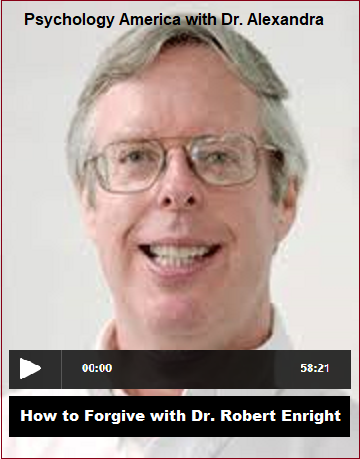 “Dr. Alexandra created and produced the 17 podcast episodes at absolutely no cost to the IFI,” according to Dr. Enright. “She knows that forgiveness can positively impact people who are hurting, and she is a fabulous forgiveness ambassador who is helping others learn about its amazing benefits.”
“Dr. Alexandra created and produced the 17 podcast episodes at absolutely no cost to the IFI,” according to Dr. Enright. “She knows that forgiveness can positively impact people who are hurting, and she is a fabulous forgiveness ambassador who is helping others learn about its amazing benefits.”
More than 65 podcast episodes are currently available on Dr. Alexandra’s website including two programs featuring interviews with Dr. Enright: “How to Forgive” (58 min.) and “Rehabilitating the ‘Forgotten People’: Prisoners” (1 hr. 7 min.).
Dr. Alexandra is a mother of four and an expert in family systems psychology, cognitive behavioral psychology (CBT) and clinical psychopharmacology. She has earned a Doctorate in Psychology, a master’s degree (Ed.S.) in Marriage and Family Therapy, and a Master of Science (MS) Degree in Clinical Psychopharmacology. She is the author of “There’s Always Hope”–– a children’s book that inspires hope and teaches empathy for the physically disabled.



